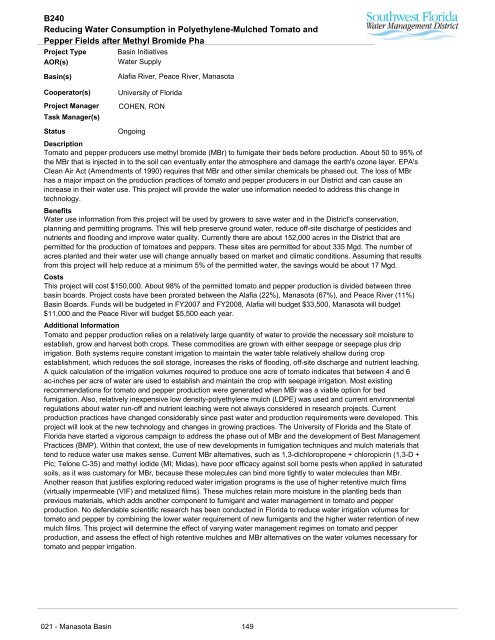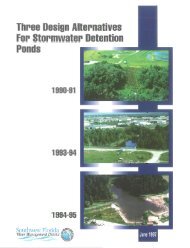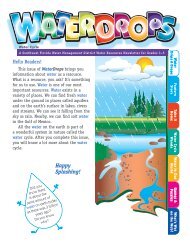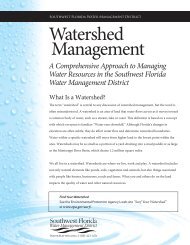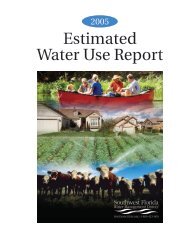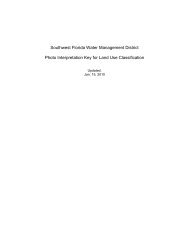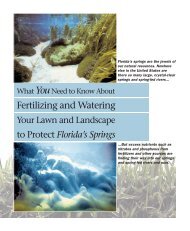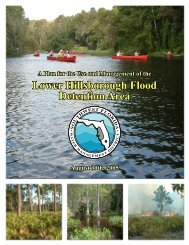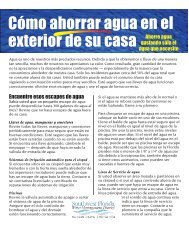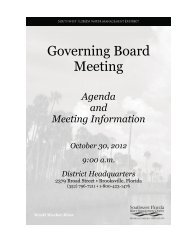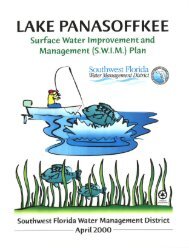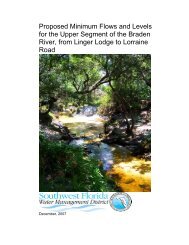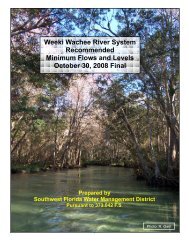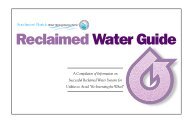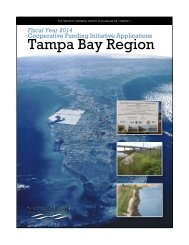- Page 1 and 2:
MEETING NOTEBOOK MANASOTA BASIN BOA
- Page 3 and 4:
AGENDA Southwest Florida Water Mana
- Page 5 and 6:
1. Call to Order, Introductions and
- Page 7 and 8:
Summary Agenda Joint Meeting and Wo
- Page 9 and 10:
Summary Agenda Joint Meeting and Wo
- Page 11 and 12:
Summary Agenda Joint Meeting and Wo
- Page 13 and 14:
Summary Agenda Joint Meeting and Wo
- Page 15 and 16:
Summary Agenda Joint Meeting and Wo
- Page 17 and 18:
Summary Agenda Joint Meeting and Wo
- Page 19 and 20:
Summary Agenda Joint Meeting and Wo
- Page 21 and 22:
Summary Agenda Joint Meeting and Wo
- Page 23 and 24:
Summary Agenda Joint Meeting and Wo
- Page 25 and 26:
Summary Agenda Joint Meeting and Wo
- Page 27 and 28:
Summary Agenda Joint Meeting and Wo
- Page 29 and 30:
Summary Agenda Joint Meeting and Wo
- Page 31 and 32:
Summary Agenda Joint Meeting and Wo
- Page 33 and 34:
Summary Agenda Joint Meeting and Wo
- Page 35 and 36:
Minutes of the Meeting August 12, 2
- Page 37 and 38:
Minutes of the Meeting August 12, 2
- Page 39 and 40:
Minutes of the Meeting August 12, 2
- Page 41:
Cooper Creek Fox Creek Shakett Cree
- Page 45 and 46:
Minutes of the Meeting August 7, 20
- Page 47 and 48:
Minutes of the Meeting August 7, 20
- Page 49 and 50:
Minutes of the Meeting August 7, 20
- Page 51:
Location Map Bermont Properties, LL
- Page 55 and 56:
PEACE RIVER BASIN OF THE SOUTHWEST
- Page 57 and 58:
Southwest Florida Water Management
- Page 59 and 60:
Southwest Florida Water Management
- Page 61 and 62:
Southwest Florida Water Management
- Page 63 and 64:
Southwest Florida Water Management
- Page 65 and 66:
Southwest Florida Water Management
- Page 67 and 68:
Southwest Florida Water Management
- Page 69 and 70:
!. Lake Level Modification Acquisit
- Page 71 and 72:
Southwest Florida Water Management
- Page 73 and 74:
Southwest Florida Water Management
- Page 75 and 76:
Southwest Florida Water Management
- Page 77 and 78:
Southwest Florida Water Management
- Page 79 and 80:
Southwest Florida Water Management
- Page 81 and 82:
Southwest Florida Water Management
- Page 84 and 85:
Southwest Florida Water Management
- Page 86 and 87:
Southwest Florida Water Management
- Page 88 and 89:
Southwest Florida Water Management
- Page 90 and 91:
Southwest Florida Water Management
- Page 92 and 93:
Southwest Florida Water Management
- Page 94 and 95:
Southwest Florida Water Management
- Page 96 and 97:
Southwest Florida Water Management
- Page 98 and 99:
W312 - Tampa Bay Habitat Restoratio
- Page 100 and 101:
B266 - Accounting For Interception
- Page 102 and 103:
L618 - Sarasota - Watershed Managem
- Page 104 and 105:
Z010 Boards & Executive Services -
- Page 106 and 107:
Z050 Information Resources - Manaso
- Page 108 and 109:
Z090 Community Affairs - Manasota B
- Page 110 and 111:
Z500 Resource Projects - Manasota B
- Page 112 and 113:
Z700 Land Resources - Manasota Basi
- Page 114 and 115:
Z930 Contingencies - Manasota Basin
- Page 116 and 117:
S019 Edward W. Chance Reserve Proje
- Page 118 and 119:
S030 RV Griffin Reserve Project Typ
- Page 120 and 121:
S032 Little Manatee River Project T
- Page 122 and 123:
S041 Myakkahatchee Creek Project Ty
- Page 124 and 125:
S099 Save Our Rivers Administration
- Page 126 and 127:
SA19 Lake Manatee Lower Watershed U
- Page 128 and 129:
D059 Myakka State Forest Hydr. Rest
- Page 130 and 131:
D060 Edward W. Chance Reserve Hydr.
- Page 132 and 133:
SI99 Environmental Education Center
- Page 134 and 135:
W020 SWIM Plan Implementation - Tam
- Page 136 and 137:
W027 Tampa Bay Estuary Program Act,
- Page 138 and 139:
W028 Bay Soundings Project Type SWI
- Page 140 and 141:
W030 Tampa Bay Watch Field Trip Pro
- Page 142 and 143:
W226 City of Anna Maria-Implementat
- Page 144 and 145:
W226 City of Anna Maria-Implementat
- Page 146 and 147:
W312 Tampa Bay Habitat Restoration
- Page 148 and 149:
W331 Biennial Seagrass Mapping of T
- Page 150 and 151:
W348 Terra Ceia Isles Habitat Resto
- Page 152 and 153:
W358 Tom Bennett Park Project Type
- Page 154 and 155:
W364 Palmetto Estuary Project Type
- Page 156 and 157:
W394 FELTS Preserve Restoration Pro
- Page 158 and 159:
W437 (Completed) North Port Water E
- Page 160 and 161:
W501 SWIM Plan Implementation - Cha
- Page 162 and 163:
W506 CHEC Charlotte Harbor/Lemon Ba
- Page 164 and 165:
W509 Alligator Creek In-Stream Rest
- Page 166 and 167:
W521 Charlotte Harbor Water Quality
- Page 168 and 169:
W526 Charlotte Harbor National Estu
- Page 170 and 171:
W528 Myakka River Water Quality Mon
- Page 172 and 173:
W547 Water Quality in the Peace and
- Page 174 and 175:
W552 Sarasota County Pollutant Mode
- Page 176 and 177:
W554 (Completed) Report and Summary
- Page 178 and 179:
W558 Venice Hatchett Creek Stormwat
- Page 180 and 181:
W559 Assessment of 2008 Seagrass Ma
- Page 182 and 183:
W601 SWIM Plan Implementation - Sar
- Page 184 and 185:
W602 Neal Preserve Environmental Re
- Page 186 and 187:
W603 Ungarelli Preserve Project Typ
- Page 188 and 189:
W604 Phillippi Creek In-stream Rest
- Page 190 and 191:
W611 Sarasota Bay Spoil Island Rest
- Page 192 and 193:
W612 Sarasota Bay Estuary Program P
- Page 194 and 195:
W613 Sarasota-Catfish Creek SW Faci
- Page 196 and 197:
W615 (Completed) Sarasota County Ti
- Page 198 and 199:
W616 Sarasota Bay Habitat Restorati
- Page 200 and 201:
W617 Sarasota Imp. BMPs Coastal Bas
- Page 202 and 203: W618 (Completed) Sarasota Imp. BMPs
- Page 204 and 205: W619 Perico Preserve Environmental
- Page 206 and 207: W620 Pelican Cove Stormwater Retrof
- Page 208 and 209: W621 Little Sarasota Bay Water Qual
- Page 210 and 211: W622 Sarasota Bay Water Quality Man
- Page 212 and 213: W623 Holmes Beach Stormwater Retrof
- Page 214 and 215: W624 Red Bug Slough Restoration Pro
- Page 216 and 217: W625 Runaway Bay - Sarasota Bay Coa
- Page 218 and 219: W626 Blackburn Point Park Addition
- Page 220 and 221: W627 Bradenton Beach Stormwater Ret
- Page 222 and 223: B063 USGS Manasota Basin Surface Wa
- Page 224 and 225: B074 Manatee - WMPlan BRADEN RIVER
- Page 226 and 227: B074 Manatee - WMPlan BRADEN RIVER
- Page 228 and 229: B092 USGS-Flatford Swamp Surface Wa
- Page 230 and 231: B099 Quality of Water Improvement P
- Page 232 and 233: B131 Hotel/Motel/Restaurant Water C
- Page 234 and 235: B136 Florida Automated Weather Netw
- Page 236 and 237: B182 USGS Minimum Flows and Levels
- Page 238 and 239: B206 Maintenance of Watershed Param
- Page 240 and 241: B206 Maintenance of Watershed Param
- Page 242 and 243: B219 Land Use and Cover Mapping Pro
- Page 244 and 245: B228 Evaluation and Demonstration o
- Page 246 and 247: B229 Field Evaluation of Bahiadwarf
- Page 248 and 249: B238 Crop Coefficients and Water Us
- Page 250 and 251: B239 Determine Water Requirements F
- Page 254 and 255: B241 Reduction of Water Use for Cit
- Page 256 and 257: B242 Potential to Use ASR in the Av
- Page 258 and 259: B246 Water Conservation/FYN Regiona
- Page 260 and 261: B246 Water Conservation/FYN Regiona
- Page 262 and 263: B251 National Hydrography Database
- Page 264 and 265: B256 Automated Citrus Irrigation Ma
- Page 266 and 267: B257 Reducing Nursery and Landscape
- Page 268 and 269: B264 Citrus Irrigation Management t
- Page 270 and 271: B265 Optimizing Irrigation For Shad
- Page 272 and 273: B266 Accounting For Interception of
- Page 274 and 275: B273 MFL Stream Diversion and Asses
- Page 276 and 277: B274 Salt Water Intrusion Monitorin
- Page 278 and 279: B276 (Cancelled) Grants for Reclaim
- Page 280 and 281: B277 Florida Water Star Gold Certif
- Page 282 and 283: B310 Manatee - Maintenance of Water
- Page 284 and 285: B315 Sarasota - Maintenance of Wate
- Page 286 and 287: B620 Mapping and GIS Project Type B
- Page 288 and 289: B630 Field Operations 021 Project T
- Page 290 and 291: P259 Youth Water Resources Educatio
- Page 292 and 293: P268 Public Education Project Type
- Page 294 and 295: P268 Public Education FY2010 Media
- Page 296 and 297: F032 Peace River Regional Reservoir
- Page 298 and 299: F032 Peace River Regional Reservoir
- Page 300 and 301: F033 Peace River Facility Expansion
- Page 302 and 303:
H008 Lake Hancock Lake Level Modifi
- Page 304 and 305:
H008 Lake Hancock Lake Level Modifi
- Page 306 and 307:
H009 Lake Hancock Outfall Structure
- Page 308 and 309:
H017 Facilitating Agricultural Reso
- Page 310 and 311:
H024 Upper Peace River Resource Dev
- Page 312 and 313:
H024 Upper Peace River Resource Dev
- Page 314 and 315:
H048 Myakka River Watershed Initiat
- Page 316 and 317:
H048 Myakka River Watershed Initiat
- Page 318 and 319:
H051 PR/MRWSA Reg Integ Loop Sys Ph
- Page 320 and 321:
H052 PR/MRWSA Reg Integ Loop Sys Ph
- Page 322 and 323:
H059 City of Bradenton Reservoir Ex
- Page 324 and 325:
H060 Punta Gorda Shell Creek WTP Ex
- Page 326 and 327:
H062 CF Industries Aquifer Recharge
- Page 328 and 329:
H063 PR/MRWSA Regional Resource Dev
- Page 330 and 331:
H069 PR/MRWSA Reg Loop System Ph 1A
- Page 332 and 333:
H076 Regional Reclaimed Water Partn
- Page 334 and 335:
H076 Regional Reclaimed Water Partn
- Page 336 and 337:
H079 PRMRWSA Regional Resource Deve
- Page 338 and 339:
H086 Manatee County Regional 10 MG
- Page 340 and 341:
H087 City of Punta Gorda Reverse Os
- Page 342 and 343:
H088 Dona Bay Water Supply Developm
- Page 344 and 345:
K114 Bradenton - ASR Program Projec
- Page 346 and 347:
K114 Bradenton - ASR Program Basin
- Page 348 and 349:
K120 North Port - Water ASR - Phase
- Page 350 and 351:
K253 Manatee - Imp. BMPs Wares Cree
- Page 352 and 353:
K253 Manatee - Imp. BMPs Wares Cree
- Page 354 and 355:
K269 Sarasota Co. - N. Sarasota Co.
- Page 356 and 357:
K883 North Port WMPlan Big Slough D
- Page 358 and 359:
L007 Manatee - WMPlan BUFFALO CANAL
- Page 360 and 361:
L010 Manatee - WMPlan GAMBLE CREEK
- Page 362 and 363:
L010 Manatee - WMPlan GAMBLE CREEK
- Page 364 and 365:
L015 Sarasota County Surface Water
- Page 366 and 367:
L019 Sarasota - Update W. Para. & M
- Page 368 and 369:
L200 Bradenton - Wares Creek Bridge
- Page 370 and 371:
L200 Bradenton - Wares Creek Bridge
- Page 372 and 373:
L206 FYN Builder/Dev Charlotte, Man
- Page 374 and 375:
L210 Implementation of BMPs - Phill
- Page 376 and 377:
L230 Longboat Key Backup Potable Wa
- Page 378 and 379:
L238 SEC Southern Coastal Watershed
- Page 380 and 381:
L506 North Port Water Conservation
- Page 382 and 383:
L509 Manatee County Rain Sensor Ins
- Page 384 and 385:
L510 FYN Manatee County Fourth advi
- Page 386 and 387:
L512 Manatee County Shallow Well Re
- Page 388 and 389:
L520 Around the Bend Nature Tours M
- Page 390 and 391:
L601 (Completed) Manatee County Ind
- Page 392 and 393:
L604 Manatee - WMPlan Little Manate
- Page 394 and 395:
L608 Palmetto Reclaimed Water ASR C
- Page 396 and 397:
L610 Sarasota County - Watershed Pl
- Page 398 and 399:
L611 Sarasota County - Watershed Pl
- Page 400 and 401:
L613 Sarasota Imp. BMPs South Pelic
- Page 402 and 403:
L614 Sarasota Imp. BMPs Matheny Cre
- Page 404 and 405:
L615 Sarasota Imp. BMPs Alligator C
- Page 406 and 407:
L617 Sarasota NAVD88 Vertical Contr
- Page 408 and 409:
L618 Sarasota - Watershed Managemen
- Page 410 and 411:
L623 Venice Imp. BMPs Hatchett Cree
- Page 412 and 413:
L624 Venice Imp. BMPs Hatchett Cree
- Page 414 and 415:
L627 City of North Port Water Conse
- Page 416 and 417:
L693 Water Exhibits in the Glazer C
- Page 418 and 419:
L854 Bradenton/Manatee Co./Palmetto
- Page 420 and 421:
L867 Sarasota County GIS Dataset De
- Page 422 and 423:
L869 (Completed) Englewood Reuse Tr
- Page 424 and 425:
L874 Aqua Utilities Reuse Transmiss
- Page 426 and 427:
L879 Southwest Wastewater Reclamati
- Page 428 and 429:
L949 Manatee County Water Conservat
- Page 430 and 431:
N013 Development of Landscape Ferti
- Page 432 and 433:
N014 The Florida Aquarium Watershed
- Page 434 and 435:
N046 Great Explorations Water Plane
- Page 436 and 437:
N081 City of North Port Brackish Gr
- Page 438 and 439:
N082 City of North Port Myakkahatch
- Page 440 and 441:
N084 City of North Port Reuse Stora
- Page 442 and 443:
N086 (Withdrawn) City of Venice Plu
- Page 444 and 445:
N087 (Withdrawn) Bradenton - Palmet
- Page 446 and 447:
N088 (Withdrawn) Bradenton - MARS R
- Page 448 and 449:
N105 The Bridges - Stormwater Reuse
- Page 450 and 451:
N107 Braden River Soil Moisture Sen
- Page 452 and 453:
N115 Manatee County Indoor Water Co
- Page 454 and 455:
N139 Low Impact Development Manual
- Page 456 and 457:
N143 FYN Sarasota County Second tas
- Page 458 and 459:
N151 Manatee County NAVD88 Vertical
- Page 460 and 461:
N181 Science Curriculum Enhancement
- Page 462 and 463:
N188 City of Bradenton NAVD88 Verti
- Page 464 and 465:
N206 G.WIZ Water Wonders Workshop S
- Page 466 and 467:
N218 Englewood Reclaimed Water Supp
- Page 468 and 469:
N231 Manatee County Toilet Rebate P
- Page 470 and 471:
M110 Manatee - FEMA Map Modernizati
- Page 472 and 473:
M115 Sarasota - FEMA Map Modernizat
- Page 474 and 475:
M118 FEMA Map Modernization Managem
- Page 476 and 477:
M118 FEMA Map Modernization Managem
- Page 478 and 479:
W507 - CHEC Peace River Watershed E
- Page 480 and 481:
P259 - Youth Water Resources Educat
- Page 482 and 483:
L900 - LE/AD Polk County Watershed
- Page 484 and 485:
Z010 Boards & Executive Services -
- Page 486 and 487:
Z050 Information Resources - Peace
- Page 488 and 489:
Z074 Risk Management - Peace River
- Page 490 and 491:
Z300 Resource Data and Restoration
- Page 492 and 493:
Z600 Operations - Peace River Basin
- Page 494 and 495:
Z910 Commissions - Peace River Basi
- Page 496 and 497:
S001 Jack Creek Project Type SOR AO
- Page 498 and 499:
S029 Upper Lake Marion Creek Waters
- Page 500 and 501:
S035 Bowlegs Creek Project Type SOR
- Page 502 and 503:
S040 Lower Peace River (Deep Creek)
- Page 504 and 505:
S054 Lake Hancock Project Type SOR
- Page 506 and 507:
S099 Save Our Rivers Administration
- Page 508 and 509:
SA01 Jack Creek Hydr. Rest. for res
- Page 510 and 511:
SB54 Polk Nature Discovery Center E
- Page 512 and 513:
W032 HCC Foundation Field Trip Prog
- Page 514 and 515:
W331 Biennial Seagrass Mapping of T
- Page 516 and 517:
W436 Elizabeth Place Water Quality
- Page 518 and 519:
W501 SWIM Plan Implementation - Cha
- Page 520 and 521:
W506 CHEC Charlotte Harbor/Lemon Ba
- Page 522 and 523:
W507 CHEC Peace River Watershed Edu
- Page 524 and 525:
W510 Restoration of Natural Systems
- Page 526 and 527:
W511 Alligator Creek Restoration Pr
- Page 528 and 529:
W513 Charlotte County Fourth-Grade
- Page 530 and 531:
W521 Charlotte Harbor Water Quality
- Page 532 and 533:
W526 Charlotte Harbor National Estu
- Page 534 and 535:
W527 Peace River Water Quality Moni
- Page 536 and 537:
W547 Water Quality in the Peace and
- Page 538 and 539:
W553 Coral Creek Habitat Restoratio
- Page 540 and 541:
W554 (Completed) Report and Summary
- Page 542 and 543:
W555 Evaluating the Effects of Rest
- Page 544 and 545:
W556 FDOT - Cape Haze Pioneer Trail
- Page 546 and 547:
W557 Characterizing Seagrass Commun
- Page 548 and 549:
W559 Assessment of 2008 Seagrass Ma
- Page 550 and 551:
W776 SWIM Plan Implementation - Win
- Page 552 and 553:
W781 South Lake Conine Watershed Re
- Page 554 and 555:
W794 Winter Haven Chain of Lakes Se
- Page 556 and 557:
W796 Chain of Lakes Water Quality M
- Page 558 and 559:
W798 Winter Haven Downtown Watershe
- Page 560 and 561:
B063 USGS Peace River Basin Surface
- Page 562 and 563:
B063 USGS Peace River Basin Surface
- Page 564 and 565:
B099 Quality of Water Improvement P
- Page 566 and 567:
B131 Hotel/Motel/Restaurant Water C
- Page 568 and 569:
B136 Florida Automated Weather Netw
- Page 570 and 571:
B163 Peace R. - Historical Land Cov
- Page 572 and 573:
B163 Peace R. - Historical Land Cov
- Page 574 and 575:
B198 Lake Jackson MFL Recovery Feas
- Page 576 and 577:
B206 Maintenance of Watershed Param
- Page 578 and 579:
B206 Maintenance of Watershed Param
- Page 580 and 581:
B217 Ridge Lakes Stormwater Improve
- Page 582 and 583:
B217 Ridge Lakes Stormwater Improve
- Page 584 and 585:
B219 Land Use and Cover Mapping 2.
- Page 586 and 587:
B226 Determine Total Water Budget &
- Page 588 and 589:
B229 Field Evaluation of Bahiadwarf
- Page 590 and 591:
B238 Crop Coefficients and Water Us
- Page 592 and 593:
B239 Determine Water Requirements F
- Page 594 and 595:
B240 Reducing Water Consumption in
- Page 596 and 597:
B241 Reduction of Water Use for Cit
- Page 598 and 599:
B242 Potential to Use ASR in the Av
- Page 600 and 601:
B243 Long-Term Water Budget Analysi
- Page 602 and 603:
B244 USGS - Hydrogeology and Qualit
- Page 604 and 605:
B246 Water Conservation/FYN Regiona
- Page 606 and 607:
B251 National Hydrography Database
- Page 608 and 609:
B256 Automated Citrus Irrigation Ma
- Page 610 and 611:
B257 Reducing Nursery and Landscape
- Page 612 and 613:
B260 Upper Peace River System - Fre
- Page 614 and 615:
B263 Evaluation of Different On-Far
- Page 616 and 617:
B264 Citrus Irrigation Management t
- Page 618 and 619:
B265 Optimizing Irrigation For Shad
- Page 620 and 621:
B266 Accounting For Interception of
- Page 622 and 623:
B268 Charlie Creek Freshwater MFLs
- Page 624 and 625:
B269 Horse Creek Freshwater MFLs Pr
- Page 626 and 627:
B273 MFL Stream Diversion and Asses
- Page 628 and 629:
B276 (Cancelled) Grants for Reclaim
- Page 630 and 631:
B277 Florida Water Star Gold Certif
- Page 632 and 633:
B277 Florida Water Star Gold Certif
- Page 634 and 635:
B301 Charlotte - Maintenance of Wat
- Page 636 and 637:
B303 Desoto - Maintenance of Waters
- Page 638 and 639:
B304 Hardee - Maintenance of Waters
- Page 640 and 641:
B306 Highlands - Maintenance of Wat
- Page 642 and 643:
B314 Polk - Maintenance of Watershe
- Page 644 and 645:
B620 Mapping and GIS The following
- Page 646 and 647:
B670 Structure Operations 020 Proje
- Page 648 and 649:
G004 Aquatic Plant Management - Pea
- Page 650 and 651:
P259 Youth Water Resources Educatio
- Page 652 and 653:
P268 Public Education Project Type
- Page 654 and 655:
P268 Public Education FY2010 Media
- Page 656 and 657:
F032 Peace River Regional Reservoir
- Page 658 and 659:
F032 Peace River Regional Reservoir
- Page 660 and 661:
F033 Peace River Facility Expansion
- Page 662 and 663:
H008 Lake Hancock Lake Level Modifi
- Page 664 and 665:
H008 Lake Hancock Lake Level Modifi
- Page 666 and 667:
H009 Lake Hancock Outfall Structure
- Page 668 and 669:
H014 Lake Hancock Outfall Treatment
- Page 670 and 671:
H015 FARMS Back-Plugging Program Pr
- Page 672 and 673:
H017 Facilitating Agricultural Reso
- Page 674 and 675:
H024 Upper Peace River Resource Dev
- Page 676 and 677:
H024 Upper Peace River Resource Dev
- Page 678 and 679:
H027 Charlotte County Regional Recl
- Page 680 and 681:
H034 Peace Creek Canal Watershed Di
- Page 682 and 683:
H048 Myakka River Watershed Initiat
- Page 684 and 685:
H048 Myakka River Watershed Initiat
- Page 686 and 687:
H051 PR/MRWSA Reg Integ Loop Sys Ph
- Page 688 and 689:
H052 PR/MRWSA Reg Integ Loop Sys Ph
- Page 690 and 691:
H060 Punta Gorda Shell Creek WTP Ex
- Page 692 and 693:
H062 CF Industries Aquifer Recharge
- Page 694 and 695:
H063 PR/MRWSA Regional Resource Dev
- Page 696 and 697:
H069 PR/MRWSA Reg Loop System Ph 1A
- Page 698 and 699:
H072 Polk County Comprehensive Wate
- Page 700 and 701:
H072 Polk County Comprehensive Wate
- Page 702 and 703:
H073 Polk County SWRUSA Carter Rd 1
- Page 704 and 705:
H076 Regional Reclaimed Water Partn
- Page 706 and 707:
H079 PRMRWSA Regional Resource Deve
- Page 708 and 709:
H080 Polk Central Florida Water Res
- Page 710 and 711:
H084 Arcadia-DeSoto Interconnect Pr
- Page 712 and 713:
H085 Charlotte County Regional Recl
- Page 714 and 715:
H087 City of Punta Gorda Reverse Os
- Page 716 and 717:
H088 Dona Bay Water Supply Developm
- Page 718 and 719:
H090 NERUSA Holly Hill Reclaimed Wa
- Page 720 and 721:
H091 Polk County SWRUSA Reclaimed W
- Page 722 and 723:
K280 Charlotte - Imp. BMPs Greater
- Page 724 and 725:
K280 Charlotte - Imp. BMPs Greater
- Page 726 and 727:
K459 Charlotte County School Board
- Page 728 and 729:
K725 FYN Polk County FY2008 Purchas
- Page 730 and 731:
L028 (Completed) Englewood Lemon Ba
- Page 732 and 733:
L151 Sebring - WMPlan Sebring Criti
- Page 734 and 735:
L152 Avon Park - WMPlan Avon Park P
- Page 736 and 737:
L153 Lake Placid Reuse Project Type
- Page 738 and 739:
L206 FYN Builder/Dev Charlotte, Man
- Page 740 and 741:
L215 Rotunda ASR Well Conversion fo
- Page 742 and 743:
L314 Highlands WMPlan Carter Creek
- Page 744 and 745:
L324 Lakeland - Lk Parker Stormwate
- Page 746 and 747:
L353 Polk WMPlan Lakes Crooked, Cli
- Page 748 and 749:
L473 Highlands WMPlan Lake Placid P
- Page 750 and 751:
L479 Lk Hollingsworth Westside SW T
- Page 752 and 753:
L485 (Cancelled) Charlotte County G
- Page 754 and 755:
L486 Charlotte - WMPlan Charlotte H
- Page 756 and 757:
L553 Dundee Reclaimed Water Use Sys
- Page 758 and 759:
L633 DeSoto - WMPlan Desoto County
- Page 760 and 761:
L640 (Completed) Punta Gorda Reuse
- Page 762 and 763:
L649 (Completed) Hydrologic Rest-Hi
- Page 764 and 765:
L671 Polk County Aquifer Recharge P
- Page 766 and 767:
L672 Polk - WMPlan Polk County oper
- Page 768 and 769:
L672 Polk - WMPlan Polk County Wate
- Page 770 and 771:
L673 Polk - Imp. BMPs Lake Belle an
- Page 772 and 773:
L674 Polk - Imp. BMPs Saddlebag Lak
- Page 774 and 775:
L679 Hardee - WMPlan Horse Creek Cr
- Page 776 and 777:
L680 Bartow - WMPlan Bartow Distric
- Page 778 and 779:
L693 Water Exhibits in the Glazer C
- Page 780 and 781:
L770 Lk Gibson Stormwater Mgmt Syst
- Page 782 and 783:
L856 Charlotte County Toilet Rebate
- Page 784 and 785:
L897 Highlands - Lake Clay Stormwat
- Page 786 and 787:
L900 LE/AD Polk County Watershed Ed
- Page 788 and 789:
L902 Lake Wales - Imp. BMPs Twin La
- Page 790 and 791:
L912 Lower Floridan Aquifer Reuse S
- Page 792 and 793:
L914 City of Lakeland Plumbing Retr
- Page 794 and 795:
L915 City of Lakeland Pre-Rinse Spr
- Page 796 and 797:
L917 Polk County Lake Bathymetric M
- Page 798 and 799:
L918 Lake Gwyn Surface Water Restor
- Page 800 and 801:
N001 Auburndale Reuse and Alternati
- Page 802 and 803:
N004 Polk is Florida-Friendly Deadl
- Page 804 and 805:
N013 Development of Landscape Ferti
- Page 806 and 807:
N014 The Florida Aquarium Watershed
- Page 808 and 809:
N024 Polk County NWRUSA Reclaimed W
- Page 810 and 811:
N063 Chain of Lakes Natural Resourc
- Page 812 and 813:
N065 City of Haines City Southern A
- Page 814 and 815:
N072 (Completed) Lake Eva Water Qua
- Page 816 and 817:
N074 Winter Haven Toilet Rebate Pro
- Page 818 and 819:
N075 City of Winter Haven Northern
- Page 820 and 821:
N112 City of Lakeland Plumbing Retr
- Page 822 and 823:
N113 Charlotte County Toilet Rebate
- Page 824 and 825:
N122 Implementation of BMPs Saddle
- Page 826 and 827:
N126 Charlotte County - Imp. BMPs a
- Page 828 and 829:
N150 Polk County NAVD88 Vertical Co
- Page 830 and 831:
N156 Polk County SWRUSA Carter Road
- Page 832 and 833:
N161 Polk County Utilities Rain Sen
- Page 834 and 835:
N162 FYN Charlotte County Fourth ad
- Page 836 and 837:
N165 Mobile Irrigation Lab for High
- Page 838 and 839:
N218 Englewood Reclaimed Water Supp
- Page 840 and 841:
N221 Winter Haven Smart Controller
- Page 842 and 843:
P727 City of Lake Wales Reuse Proje
- Page 844 and 845:
M104 Hardee - FEMA Map Modernizatio
- Page 846 and 847:
M106 Highlands - FEMA Map Moderniza
- Page 848 and 849:
M114 Polk County Watershed Manageme
- Page 850 and 851:
M114 Polk County Watershed Manageme
- Page 852 and 853:
M118 FEMA Map Modernization Managem
- Page 854 and 855:
MANASOTA BASIN STRATEGIC BUDGET PRI
- Page 856 and 857:
PEACE RIVER BASIN STRATEGIC BUDGET
- Page 858:
Turner Agri-Civic Center 2250 NE Ro


